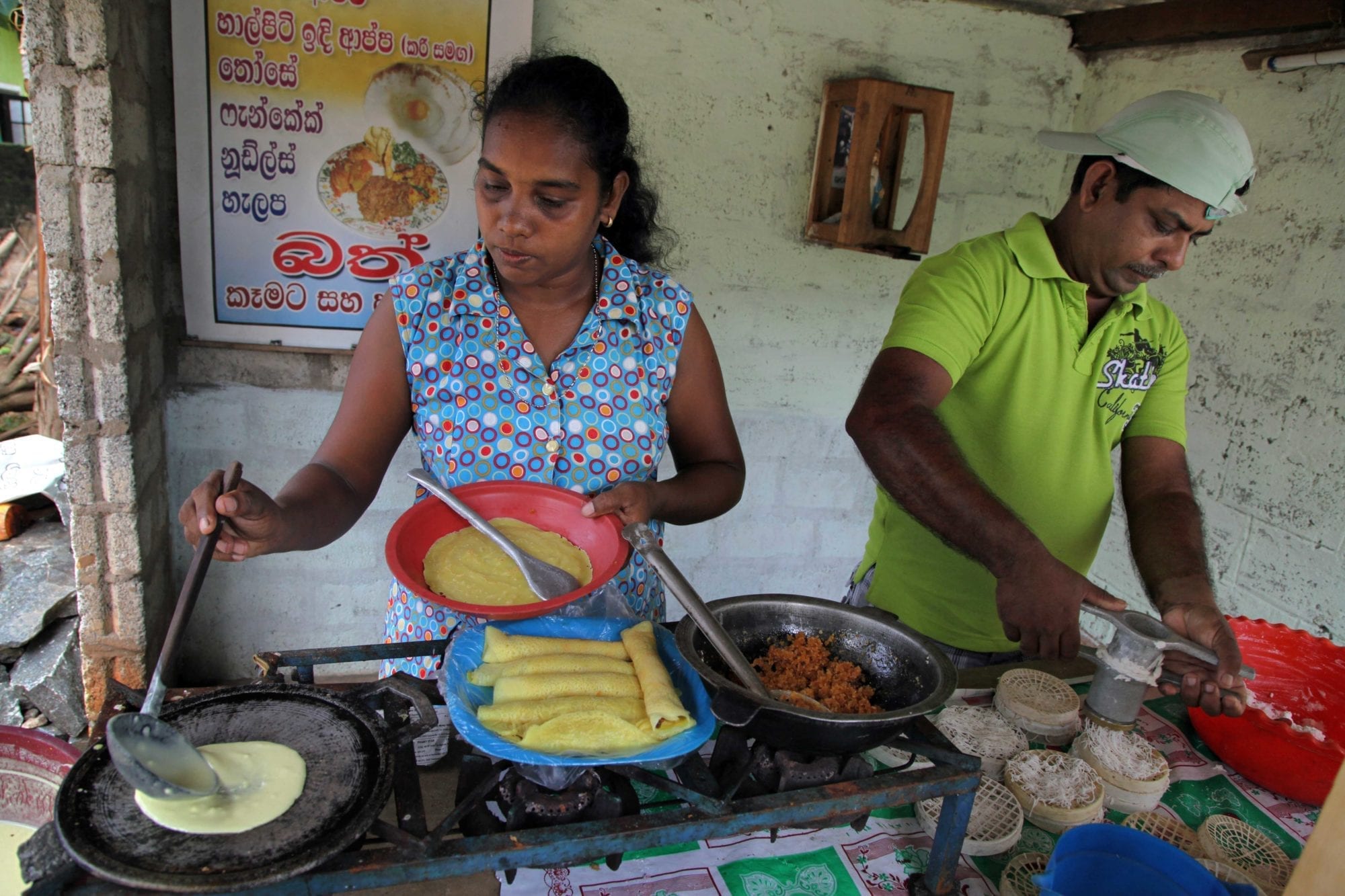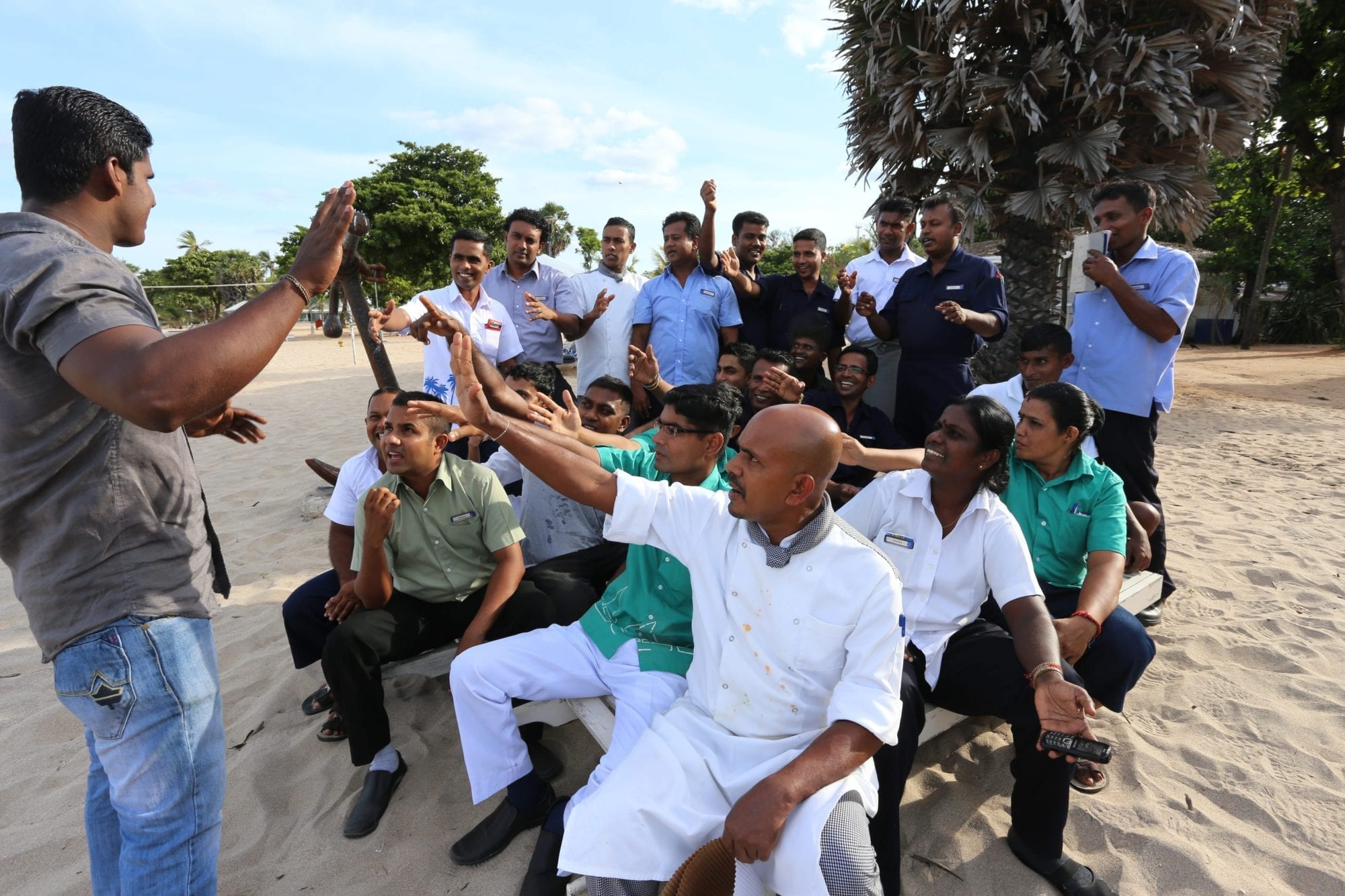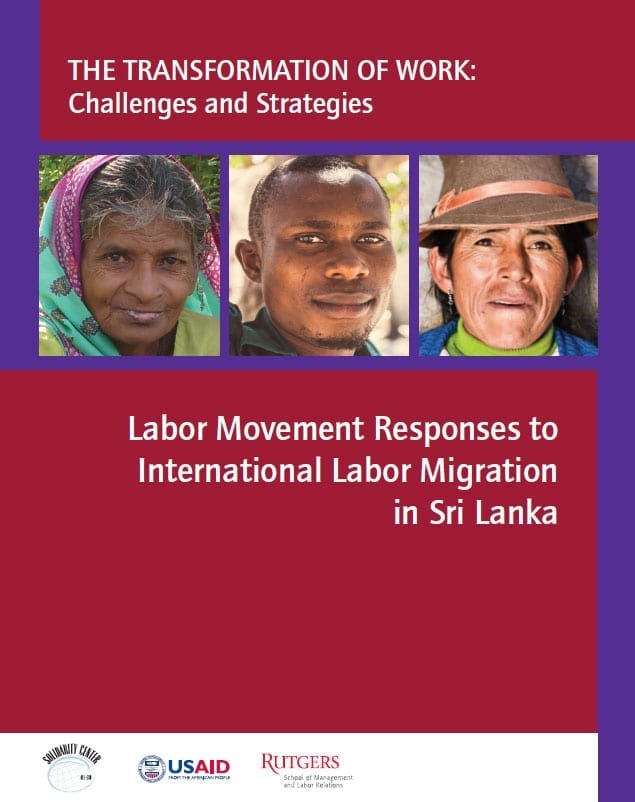
Sep 7, 2016
The 2009 end of Sri Lanka’s civil war was an opportunity for workers to return to the security and protections of the formal economy, which had been destabilized by 26 years of violence. However, a new Solidarity Center survey finds that peace has yet to bring the hoped-for economic gains to workers in Jaffna, the capital of Sri Lanka’s Northern Province. The survey’s findings on working conditions are especially important because the exploitation of workers is not only a setback for healthy industrial relations in Sri Lanka’s economy, but has the potential to aggravate social tensions and interfere with the ongoing process of peacebuilding.
“The bulk of the workers in Jaffna are in low-paid jobs with minimal labor standards, social protection and security of tenure, which are not conducive to creating sustainable livelihoods,” according to the summary.
“A key element to address conflict is equal treatment under the law,” says Tim Ryan, Asia regional program director at the Solidarity Center, who presented the survey’s findings during a recent discussion of the report at the National Endowment for Democracy (NED) in Washington, D.C.
According to Ryan, the survey seeks to provide economic data on workers in Northern and Eastern Sri Lanka that go beyond employment statistics. “Are they finding ways to both protect their rights under the law? Are laws and standards being equitably enforced?”
Workers Rights Laws Not Enforced
Despite worker-friendly Sri Lankan legislation like the Employees’ Provident Fund (EPF), an employer-funded government social security that has existed for decades, the Solidarity Center’s survey shows a majority of workers—76 percent—do not have the labor rights they are legally guaranteed due to a lack of enforcement. Of that percentage, only 22 percent of female respondents and 46 percent of male respondents say they receive what they are owed by the EPF.
The gendered difference in access to social protections is only one example of a trend persistent throughout the survey’s results, which suggests that female workers are disproportionately disadvantaged under the current conditions. A large wage gap exists between male and female respondents, including between employees doing identical work. The rate of female unemployment is nearly double that of male unemployment. And more than 80 percent of female respondents say they are unaware of their right to overtime benefits, compared with 49 percent of male respondents.
More such initiatives are needed. Although Sri Lanka is a member of the International Labor Organization (ILO), the survey confirms that more progress is needed to move the country toward the goals outlined in the ILO’s agenda for decent work. While ongoing tension and inequalities in Sri Lankan politics complicate the protection of worker rights through legislation, workers’ organizations like trade unions can help hold employers accountable to their employees and bring Sri Lanka in line with the standards of the international community.
“Workers in Post-Civil War Jaffna: A Snapshot of Working Conditions, Opportunities and Inequalities in Northern Sri Lanka” was made possible through a NED grant.

Aug 30, 2016
Although Sri Lanka’s labor code sets the minimum wage, the maximum number of work hours per day and work days per week, and establishes rules around overtime and benefits, many employers in Jaffna, the country’s northern province, are flaunting the statutes. The vast majority of workers are unaware of their rights regarding pay, benefits and a written contract.
Download here.

Feb 11, 2015
In Sri Lanka, where the union movement faces challenges familiar to many union activists around the world—a shift from industrial to service jobs and a related decline in union membership—strategic online outreach is drawing young workers and expanding union membership.
Launched in 2013, the website Wedabima (“workflow” in Sinhalese), offers an interactive platform for workers to share comments, learn about union-related workshops and access a labor perspective on daily news unavailable in the mainstream press. The site also has mobilized workers to action—after Wedabima raised concern over the potential for a memorandum of understanding between Sri Lanka and China to weaken labor laws in Sri Lanka, workers and their unions joined to bring the issues to national attention. As a result, the Sri Lankan government has asked unions to submit an analysis of a potential bilateral agreement. The site, now in Sinhalese, will expand to Tamil in coming months.
“We are able to reach a vast audience we weren’t able to before,” says Mohamed Sha, a lawyer and worker rights activist who helped launch the project with the Solidarity Center in Colombo, Sri Lanka’s capital. The Wedabima and related Facebook site draw thousands of visitors, nearly all of whom work in the service sector, a rapidly growing industry where job growth is outpacing the country’s traditional export manufacturing sector.
Making unions attractive to young workers in Sri Lanka’s booming tourism industry is especially key, says Sha, because national income from tourism is on track to overtake the garment sector, which now makes up a large percentage of Sri Lanka’s export earnings. Another goal involves empowering current union members to take a more active role in their unions. Wedabima staff interviews lower-level leaders and posts these video or written interviews on the site, raising their profile to the extent that several are now well-known as leaders in their unions.
The website’s latest feature is geared toward the more than 2 million Sri Lankans who work abroad. The site provides migrant workers, who work in a wide variety of jobs, with contact information for the Embassy of Sri Lanka and other organizations that can assist migrant workers in countries where the majority are employed, such as in Qatar, Saudi Arabia and Jordan. The site also includes information about their legal rights in each country. Sha says the site will also be linked with a national radio program for migrant workers to expand resources and outreach available to workers.
Building a website does not guarantee an audience, and Sha says that an essential component of drawing workers to the new site involved hands-on outreach to the Asia Pacific Network, an intergovernmental group whose young, tech-savvy members helped spread the word about Wedabima’s resources. Those resources also include the latest music downloads, entertainment news and even recipes—features that bring visitors back to the site even when they are not looking for labor-related information.
With its many features and platforms, such digital outreach aims for a very traditional goal:
“We’re trying to cultivate activists,” says Sha.

Jan 10, 2014
This report looks at the political and economic context within which Sri Lankan unions have attempted to respond to migrant workers, unions’ role in the key governance and policy mechanisms that pertain to labor migration, and the way the Sri Lankan labor movement responded to international migrant workers.
Download here.
Nov 21, 2013
Update, November 21, 2013—Hundreds of striking workers at Ansell Lanka marched to the Australian High Commission office yesterday, the 40th day of the strike at the manufacturing plant. Workers sought a response to the union’s request for the office to help achieve a resolution.
You can take action: Tell Ansell CEO and managing director to negotiate with workers at Ansell Lanka here.
Sign a letter of solidarity to striking workers here. The global union federation, IndustriAll, is hosting the online campaign.
November 19, 2013—More than 800 workers at the Ansell Lanka Ltd., factory in Sri Lanka have been on strike since October 11, seeking recognition of their union and re-instatement of 11 fired workers associated with organizing the union. The union president was among the workers fired, according to Anton Marcus, joint secretary of the Free Trade Zones & General Services Employees Union (FTZ&GSEU), a Sri Lankan affiliate of the global union IndustriAll.
Women make up more than 60 percent of the workers, who manufacture surgical and industrial latex gloves for export. The strike at the factory, located in the Biyagama Export Processing Zone (EPZ) in western Sri Lanka, is one of the longest to date in any of country’s EPZs.
Management at the factory, owned by Ansell Limited, which operates 29 facilities in 16 countries with corporate headquarters in Australia and New Jersey, rejected all proposals made by the Sri Lanka commissioner of Labor and the minister of Labor to resolve the situation in a just and equitable manner. To date, no settlement has been reached and no inquiry has been held to look into the dismissal of the 11 workers, Marcus said.
Workers sought a union after Ansell Lanka management unilaterally raised production targets and increasingly hired contract workers, who typically are paid lower wages. The factory has a long history of anti-unionism, refusing to accept workers’ choice for a union as far back as 1994, Marcus said.
The workers have drawn international labor support, with the AFL-CIO, the International Trade Union Confederation (ITUC), UNI and other global trade union federations requesting immediate settlement of the strike.
Tell Ansell CEO and managing director to negotiate with workers at Ansell Lanka here.




